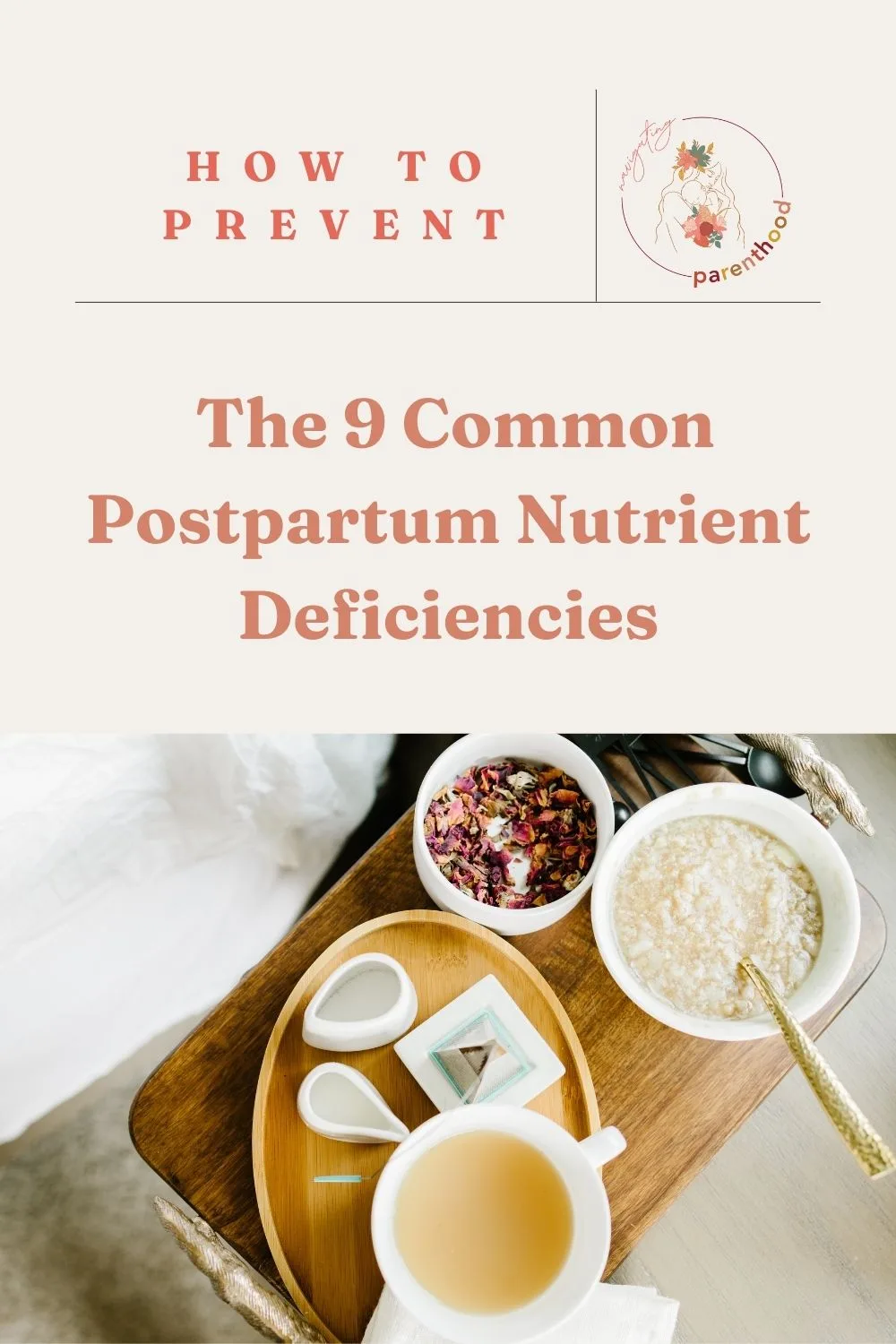The 9 Most Common Postpartum Nutrient Deficiencies and How to Prevent Them
Bringing a new life into the world is undoubtedly one of the most transformative experiences a person can go through. However, the postpartum period, often referred to as the fourth trimester, can be a time of significant physical and emotional challenges for new mothers. Amid the joy and exhaustion, the demands of caring for a newborn, and adapting to a new routine, it’s easy for a crucial aspect of postpartum health to be overlooked: nutrition. Mothers are entering postpartum with nutrient deficiencies, leading to postpartum depletion syndrome, slower recovery, and an onslaught of overlooked health issues. We’ve asked postpartum depletion experts to share the most commonly depleted nutrients that are essential to postpartum recovery and health many years later, and they’ve shared nine! Keep reading to learn more about these essential nutrients and where to find them.
Disclaimer: This post is NOT medical advice and is no substitute for visiting a doctor. Everything shared on NavigatingParenthood.com and within this post is meant as an educational tool to close the “I wish I knew” gap. Please share your new knowledge and any questions with your doctor or specialist.

Protein
The American College of Obstetricians and Gynecologists recommends that pregnant women consume at least 75 grams of protein per day. Protein is essential for tissue repair and growth, making it especially important during pregnancy and postpartum recovery. It’s also important for maintaining healthy hormone levels and boosting the immune system. In fact, a study published in the Journal of the Academy of Nutrition and Dietetics found that women who consumed more protein during pregnancy had a lower risk of developing gestational diabetes and preeclampsia!
Sources of protein: Lean meats, fish, eggs, beans, lentils, and nuts.
Iron
According to Motherwell Nutrition founder, Alison Boden, Iron is one of the most common — and most undertreated — nutrient deficiencies in new moms. The World Health Organization estimates that approximately 42% of pregnant women worldwide are anemic, which is often caused by iron deficiency.
“If you have symptoms like fatigue, persistent hair loss, dizziness, or low mood request a full iron panel with ferritin from your doctor,” she adds. Iron is essential for the production of hemoglobin, which carries oxygen to the body’s cells. During pregnancy, a woman’s blood volume increases, requiring more iron to support the growing baby. After childbirth, the body needs to replenish the iron stores that were used during pregnancy. It is important not only for you but for your baby’s development and thyroid function.
Sources of iron: Red meat, poultry, fish, beans, lentils, spinach, and fortified cereals.
DHA Omega-3 Fatty Acids
Omega-3 fatty acids are essential for brain development and function. During pregnancy, they’re crucial for the development of the fetal brain and nervous system. After childbirth, they’re important for maintaining healthy brain function and preventing postpartum depression. In fact, a review of 26 studies published in the Journal of Clinical Psychiatry found that omega-3 supplementation was effective in reducing symptoms of depression in both pregnant and postpartum women.
Sources of omega-3 fatty acids: Fatty fish, such as salmon, mackerel, and sardines, as well as flaxseeds and walnuts.
B Vitamins
B vitamins are essential for energy production, mood regulation, and brain function. A study published in the journal Nutrients found that low levels of vitamin B12 during pregnancy were associated with an increased risk of postpartum depression. During pregnancy and postpartum recovery, the body requires more B vitamins to support the growing baby and to replenish the nutrients that were used during pregnancy.
Sources of B vitamins: Whole grains, lean meats, dairy products, eggs, and leafy greens.
We’re screaming “Self Care!!!!!” at new moms without actually addressing the elephant in the room — the severe physical depletions and the changes that are expected to happen after giving birth that literally no one is helping moms address.
Alison Boden
Zinc
Zinc is an important trace element for your immune system, growth, blood clotting, wound healing, and thyroid function. Zinc is also important for expecting and new mothers to take because your growing baby needs it while in utero and breastfeeding/ body feeding.
Sources of zinc: Poultry, red meat, and fish.
Vitamin D
Vitamin D is essential for bone health and immune function for both mom and baby. During pregnancy and postpartum recovery, the body requires more vitamin D to support the growing baby and to replenish the nutrients that were used during pregnancy. “Vitamin D plays a role in the immune system, nervous system, creating strong bones and muscles, and the brain, and helps reduce the risk of postpartum depression, adds Joy Stephenson-Laws, founder of Proactive Health Labs.
Good sources of vitamin D: Sunlight, fatty fish, egg yolks, and fortified foods.
Magnesium
Magnesium is important for muscle and nerve function, as well as bone health. During pregnancy and postpartum recovery, the body requires more magnesium to support the growing baby and to replenish the nutrients that were used during pregnancy. A review of 22 studies published in the journal Nutrients found that magnesium supplementation was effective in reducing symptoms of depression in both pregnant and postpartum women. The American College of Obstetricians and Gynecologists recommends that pregnant women consume at least 350-360 milligrams of magnesium per day.
Good sources of magnesium: Leafy greens, nuts, seeds, and whole grains.
Copper
Copper is an essential mineral that is important for immune function and collagen synthesis. The recommended daily intake of copper during pregnancy is 1 milligram per day. A study published in the Journal of Trace Elements in Medicine and Biology found that low copper levels during pregnancy were associated with an increased risk of postpartum depression. “Our bodies use this mineral to make energy, form connective tissues, maintain our nervous system, and support our immune system. It also plays a role in brain development,” shares Joy.
Sources of copper: Chocolate, shellfish, whole grains, nuts and seeds, and organ meats.
Vitamin C
Vitamin C is an antioxidant that’s important for immune function and collagen synthesis which
helps us to heal.
Sources of Vitamin C: Fruits, red and green peppers, broccoli, and cantaloupe.
Choline
A study published in the Journal of the International Society of Sports Nutrition found that choline supplementation during pregnancy was associated with better cognitive function in infants, making it an important nutrient during pregnancy and lactating.
Sources of Choline: Organ meats and eggs.
One of the best ways to combat postpartum depletion syndrome or nutrient depletion is to prevent it. This can be easier said than done, though. Total prevention would mean ensuring that all of a new mother’s nutrient stores are packed before conceiving and that she continues to meet the required nutrient needs of her body throughout pregnancy and into postpartum. Since many mothers enter pregnancy already depleted, the key to prevention starts years before pregnancy. That doesn’t mean ensuring that you meet the recommended nutrient intake for pregnancy and getting the proper nutrient testing done with a qualified health practitioner isn’t helpful, though. With expert guidance, you can improve your body’s absorption and retention of these nutrients to avoid postnatal depletion syndrome. If you’re already postpartum and experiencing symptoms of postnatal depletion syndrome, adding these nutrients to your diet under the guidance of a professional based on your allergies and medical history might be extremely beneficial.


